Transition Graduate Practice: Challenges, Competency, and Mentorship
VerifiedAdded on 2022/09/28
|9
|2135
|19
Report
AI Summary
This report provides an in-depth analysis of the challenges faced by newly graduated nurses transitioning into clinical practice. It explores the differences between the academic and clinical environments, highlighting the need for support and mentorship programs. The paper emphasizes the importance of competency, defined as the integration of skills, knowledge, abilities, and judgment, and how it helps nurses understand their roles and responsibilities. It discusses the role of the Nursing and Midwifery Board of Australia (NMBA) and the International Code of Ethics for Nurses in aiding adaptation to new environments. The report addresses challenges such as increased patient loads, complex conditions, and the shortage of mentors, and it underscores the value of mentorship in building confidence and autonomy. It also examines the impact of hostile work environments and bullying on new nurses, and it suggests strategies for empowerment and orientation to ensure job satisfaction and quality care. The report emphasizes the need for a supportive working environment and the importance of adequate time for nurses to develop competency, concluding that successful transitions depend on the environment and the new graduate's determination.
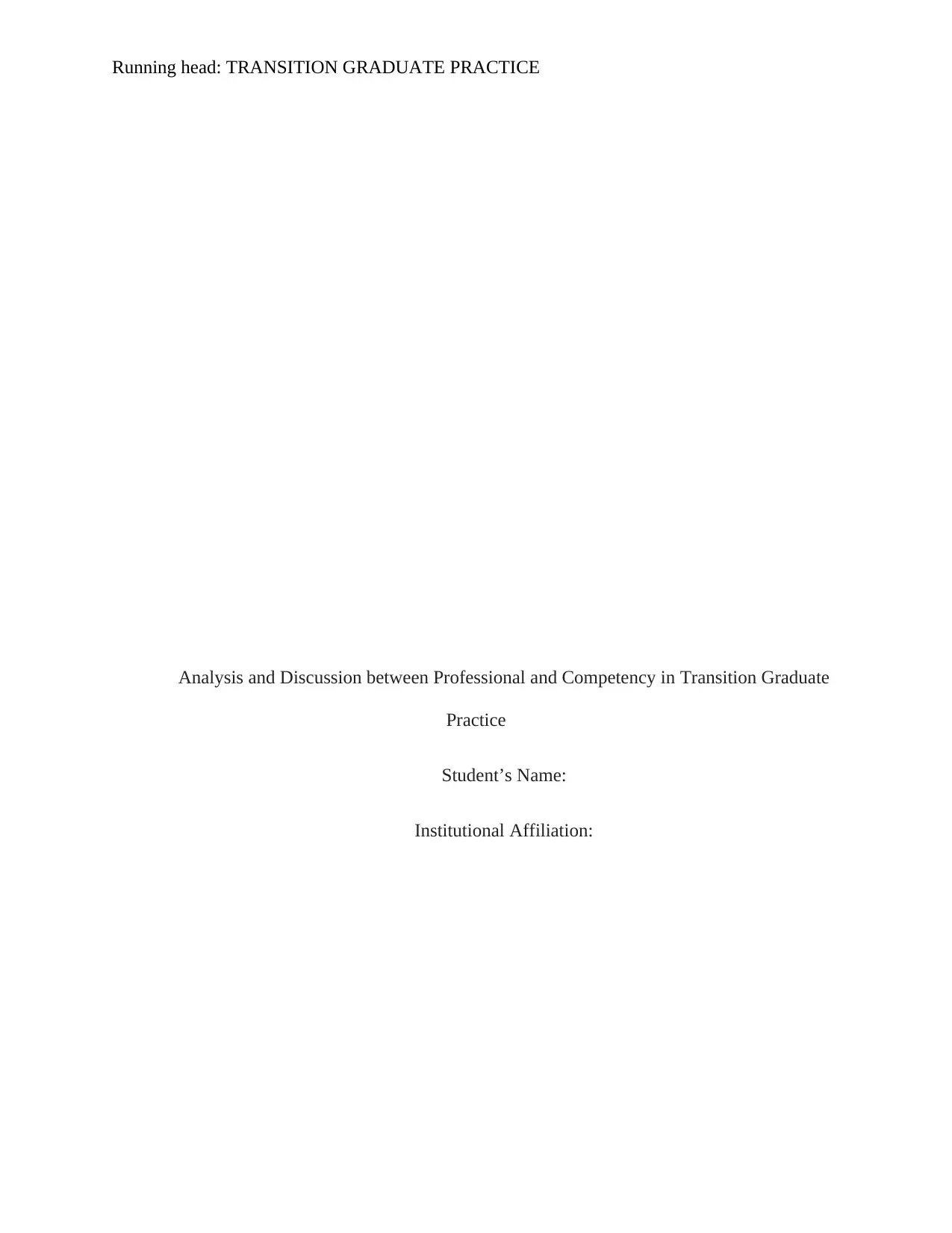
Running head: TRANSITION GRADUATE PRACTICE
Analysis and Discussion between Professional and Competency in Transition Graduate
Practice
Student’s Name:
Institutional Affiliation:
Analysis and Discussion between Professional and Competency in Transition Graduate
Practice
Student’s Name:
Institutional Affiliation:
Paraphrase This Document
Need a fresh take? Get an instant paraphrase of this document with our AI Paraphraser
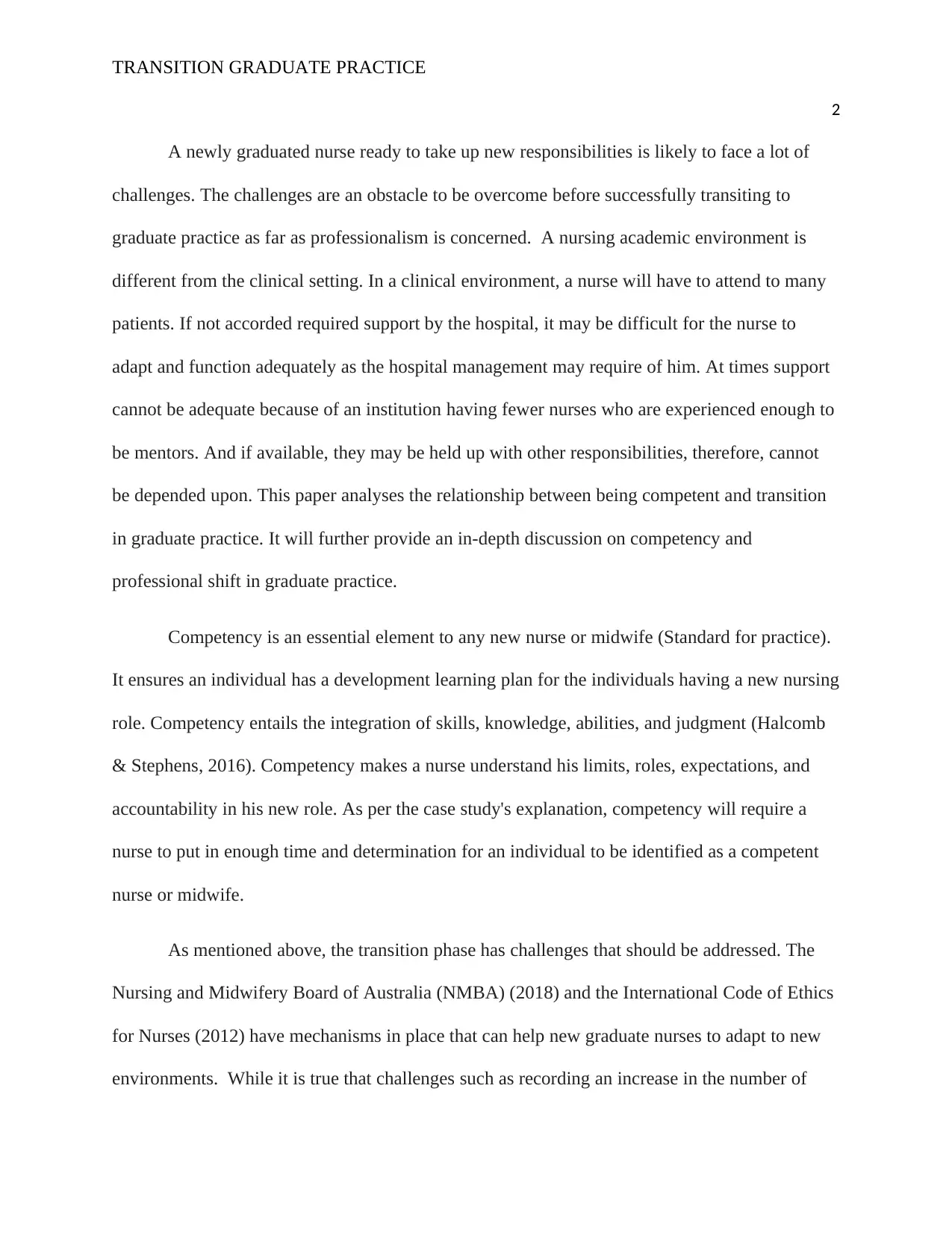
TRANSITION GRADUATE PRACTICE
2
A newly graduated nurse ready to take up new responsibilities is likely to face a lot of
challenges. The challenges are an obstacle to be overcome before successfully transiting to
graduate practice as far as professionalism is concerned. A nursing academic environment is
different from the clinical setting. In a clinical environment, a nurse will have to attend to many
patients. If not accorded required support by the hospital, it may be difficult for the nurse to
adapt and function adequately as the hospital management may require of him. At times support
cannot be adequate because of an institution having fewer nurses who are experienced enough to
be mentors. And if available, they may be held up with other responsibilities, therefore, cannot
be depended upon. This paper analyses the relationship between being competent and transition
in graduate practice. It will further provide an in-depth discussion on competency and
professional shift in graduate practice.
Competency is an essential element to any new nurse or midwife (Standard for practice).
It ensures an individual has a development learning plan for the individuals having a new nursing
role. Competency entails the integration of skills, knowledge, abilities, and judgment (Halcomb
& Stephens, 2016). Competency makes a nurse understand his limits, roles, expectations, and
accountability in his new role. As per the case study's explanation, competency will require a
nurse to put in enough time and determination for an individual to be identified as a competent
nurse or midwife.
As mentioned above, the transition phase has challenges that should be addressed. The
Nursing and Midwifery Board of Australia (NMBA) (2018) and the International Code of Ethics
for Nurses (2012) have mechanisms in place that can help new graduate nurses to adapt to new
environments. While it is true that challenges such as recording an increase in the number of
2
A newly graduated nurse ready to take up new responsibilities is likely to face a lot of
challenges. The challenges are an obstacle to be overcome before successfully transiting to
graduate practice as far as professionalism is concerned. A nursing academic environment is
different from the clinical setting. In a clinical environment, a nurse will have to attend to many
patients. If not accorded required support by the hospital, it may be difficult for the nurse to
adapt and function adequately as the hospital management may require of him. At times support
cannot be adequate because of an institution having fewer nurses who are experienced enough to
be mentors. And if available, they may be held up with other responsibilities, therefore, cannot
be depended upon. This paper analyses the relationship between being competent and transition
in graduate practice. It will further provide an in-depth discussion on competency and
professional shift in graduate practice.
Competency is an essential element to any new nurse or midwife (Standard for practice).
It ensures an individual has a development learning plan for the individuals having a new nursing
role. Competency entails the integration of skills, knowledge, abilities, and judgment (Halcomb
& Stephens, 2016). Competency makes a nurse understand his limits, roles, expectations, and
accountability in his new role. As per the case study's explanation, competency will require a
nurse to put in enough time and determination for an individual to be identified as a competent
nurse or midwife.
As mentioned above, the transition phase has challenges that should be addressed. The
Nursing and Midwifery Board of Australia (NMBA) (2018) and the International Code of Ethics
for Nurses (2012) have mechanisms in place that can help new graduate nurses to adapt to new
environments. While it is true that challenges such as recording an increase in the number of
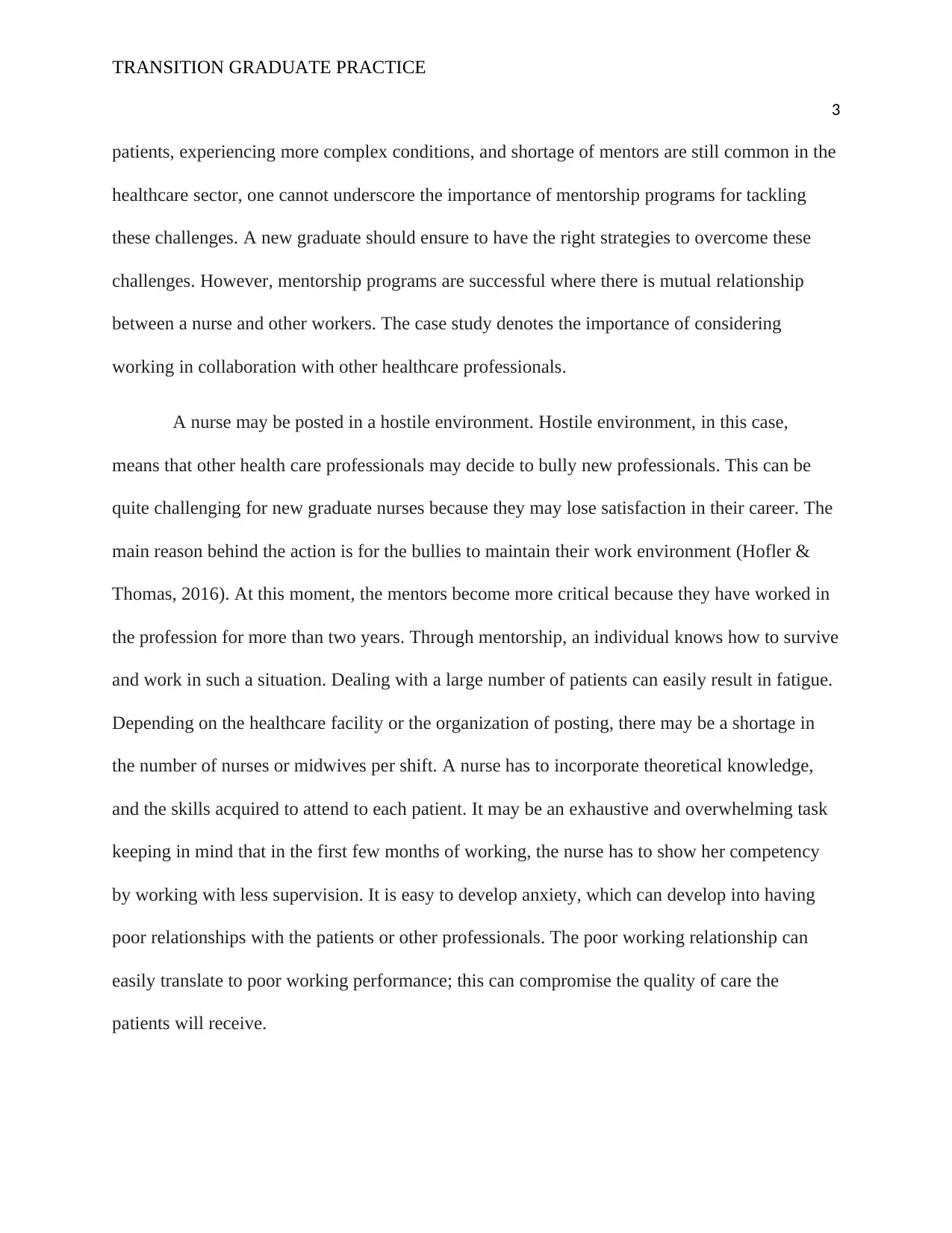
TRANSITION GRADUATE PRACTICE
3
patients, experiencing more complex conditions, and shortage of mentors are still common in the
healthcare sector, one cannot underscore the importance of mentorship programs for tackling
these challenges. A new graduate should ensure to have the right strategies to overcome these
challenges. However, mentorship programs are successful where there is mutual relationship
between a nurse and other workers. The case study denotes the importance of considering
working in collaboration with other healthcare professionals.
A nurse may be posted in a hostile environment. Hostile environment, in this case,
means that other health care professionals may decide to bully new professionals. This can be
quite challenging for new graduate nurses because they may lose satisfaction in their career. The
main reason behind the action is for the bullies to maintain their work environment (Hofler &
Thomas, 2016). At this moment, the mentors become more critical because they have worked in
the profession for more than two years. Through mentorship, an individual knows how to survive
and work in such a situation. Dealing with a large number of patients can easily result in fatigue.
Depending on the healthcare facility or the organization of posting, there may be a shortage in
the number of nurses or midwives per shift. A nurse has to incorporate theoretical knowledge,
and the skills acquired to attend to each patient. It may be an exhaustive and overwhelming task
keeping in mind that in the first few months of working, the nurse has to show her competency
by working with less supervision. It is easy to develop anxiety, which can develop into having
poor relationships with the patients or other professionals. The poor working relationship can
easily translate to poor working performance; this can compromise the quality of care the
patients will receive.
3
patients, experiencing more complex conditions, and shortage of mentors are still common in the
healthcare sector, one cannot underscore the importance of mentorship programs for tackling
these challenges. A new graduate should ensure to have the right strategies to overcome these
challenges. However, mentorship programs are successful where there is mutual relationship
between a nurse and other workers. The case study denotes the importance of considering
working in collaboration with other healthcare professionals.
A nurse may be posted in a hostile environment. Hostile environment, in this case,
means that other health care professionals may decide to bully new professionals. This can be
quite challenging for new graduate nurses because they may lose satisfaction in their career. The
main reason behind the action is for the bullies to maintain their work environment (Hofler &
Thomas, 2016). At this moment, the mentors become more critical because they have worked in
the profession for more than two years. Through mentorship, an individual knows how to survive
and work in such a situation. Dealing with a large number of patients can easily result in fatigue.
Depending on the healthcare facility or the organization of posting, there may be a shortage in
the number of nurses or midwives per shift. A nurse has to incorporate theoretical knowledge,
and the skills acquired to attend to each patient. It may be an exhaustive and overwhelming task
keeping in mind that in the first few months of working, the nurse has to show her competency
by working with less supervision. It is easy to develop anxiety, which can develop into having
poor relationships with the patients or other professionals. The poor working relationship can
easily translate to poor working performance; this can compromise the quality of care the
patients will receive.
⊘ This is a preview!⊘
Do you want full access?
Subscribe today to unlock all pages.

Trusted by 1+ million students worldwide
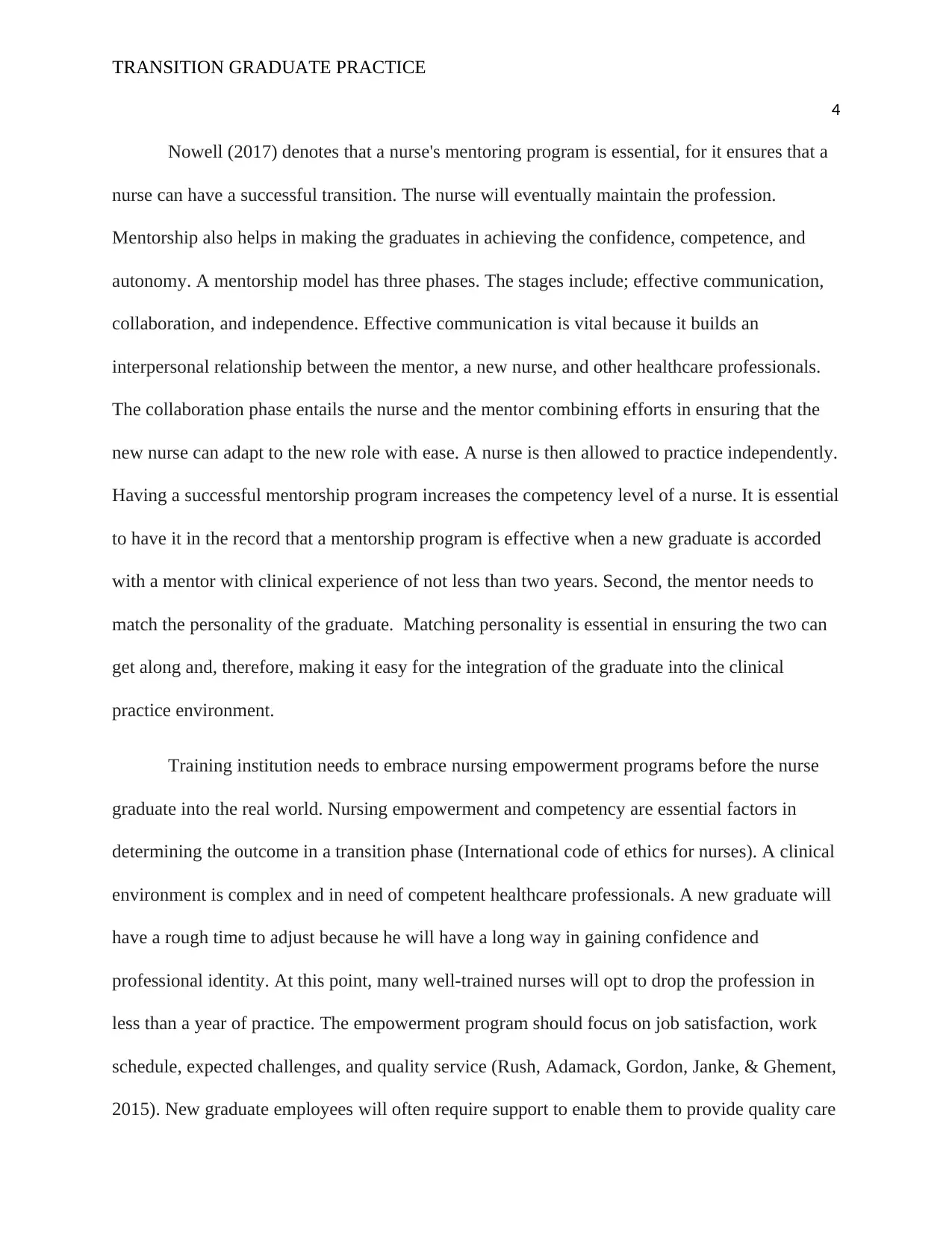
TRANSITION GRADUATE PRACTICE
4
Nowell (2017) denotes that a nurse's mentoring program is essential, for it ensures that a
nurse can have a successful transition. The nurse will eventually maintain the profession.
Mentorship also helps in making the graduates in achieving the confidence, competence, and
autonomy. A mentorship model has three phases. The stages include; effective communication,
collaboration, and independence. Effective communication is vital because it builds an
interpersonal relationship between the mentor, a new nurse, and other healthcare professionals.
The collaboration phase entails the nurse and the mentor combining efforts in ensuring that the
new nurse can adapt to the new role with ease. A nurse is then allowed to practice independently.
Having a successful mentorship program increases the competency level of a nurse. It is essential
to have it in the record that a mentorship program is effective when a new graduate is accorded
with a mentor with clinical experience of not less than two years. Second, the mentor needs to
match the personality of the graduate. Matching personality is essential in ensuring the two can
get along and, therefore, making it easy for the integration of the graduate into the clinical
practice environment.
Training institution needs to embrace nursing empowerment programs before the nurse
graduate into the real world. Nursing empowerment and competency are essential factors in
determining the outcome in a transition phase (International code of ethics for nurses). A clinical
environment is complex and in need of competent healthcare professionals. A new graduate will
have a rough time to adjust because he will have a long way in gaining confidence and
professional identity. At this point, many well-trained nurses will opt to drop the profession in
less than a year of practice. The empowerment program should focus on job satisfaction, work
schedule, expected challenges, and quality service (Rush, Adamack, Gordon, Janke, & Ghement,
2015). New graduate employees will often require support to enable them to provide quality care
4
Nowell (2017) denotes that a nurse's mentoring program is essential, for it ensures that a
nurse can have a successful transition. The nurse will eventually maintain the profession.
Mentorship also helps in making the graduates in achieving the confidence, competence, and
autonomy. A mentorship model has three phases. The stages include; effective communication,
collaboration, and independence. Effective communication is vital because it builds an
interpersonal relationship between the mentor, a new nurse, and other healthcare professionals.
The collaboration phase entails the nurse and the mentor combining efforts in ensuring that the
new nurse can adapt to the new role with ease. A nurse is then allowed to practice independently.
Having a successful mentorship program increases the competency level of a nurse. It is essential
to have it in the record that a mentorship program is effective when a new graduate is accorded
with a mentor with clinical experience of not less than two years. Second, the mentor needs to
match the personality of the graduate. Matching personality is essential in ensuring the two can
get along and, therefore, making it easy for the integration of the graduate into the clinical
practice environment.
Training institution needs to embrace nursing empowerment programs before the nurse
graduate into the real world. Nursing empowerment and competency are essential factors in
determining the outcome in a transition phase (International code of ethics for nurses). A clinical
environment is complex and in need of competent healthcare professionals. A new graduate will
have a rough time to adjust because he will have a long way in gaining confidence and
professional identity. At this point, many well-trained nurses will opt to drop the profession in
less than a year of practice. The empowerment program should focus on job satisfaction, work
schedule, expected challenges, and quality service (Rush, Adamack, Gordon, Janke, & Ghement,
2015). New graduate employees will often require support to enable them to provide quality care
Paraphrase This Document
Need a fresh take? Get an instant paraphrase of this document with our AI Paraphraser
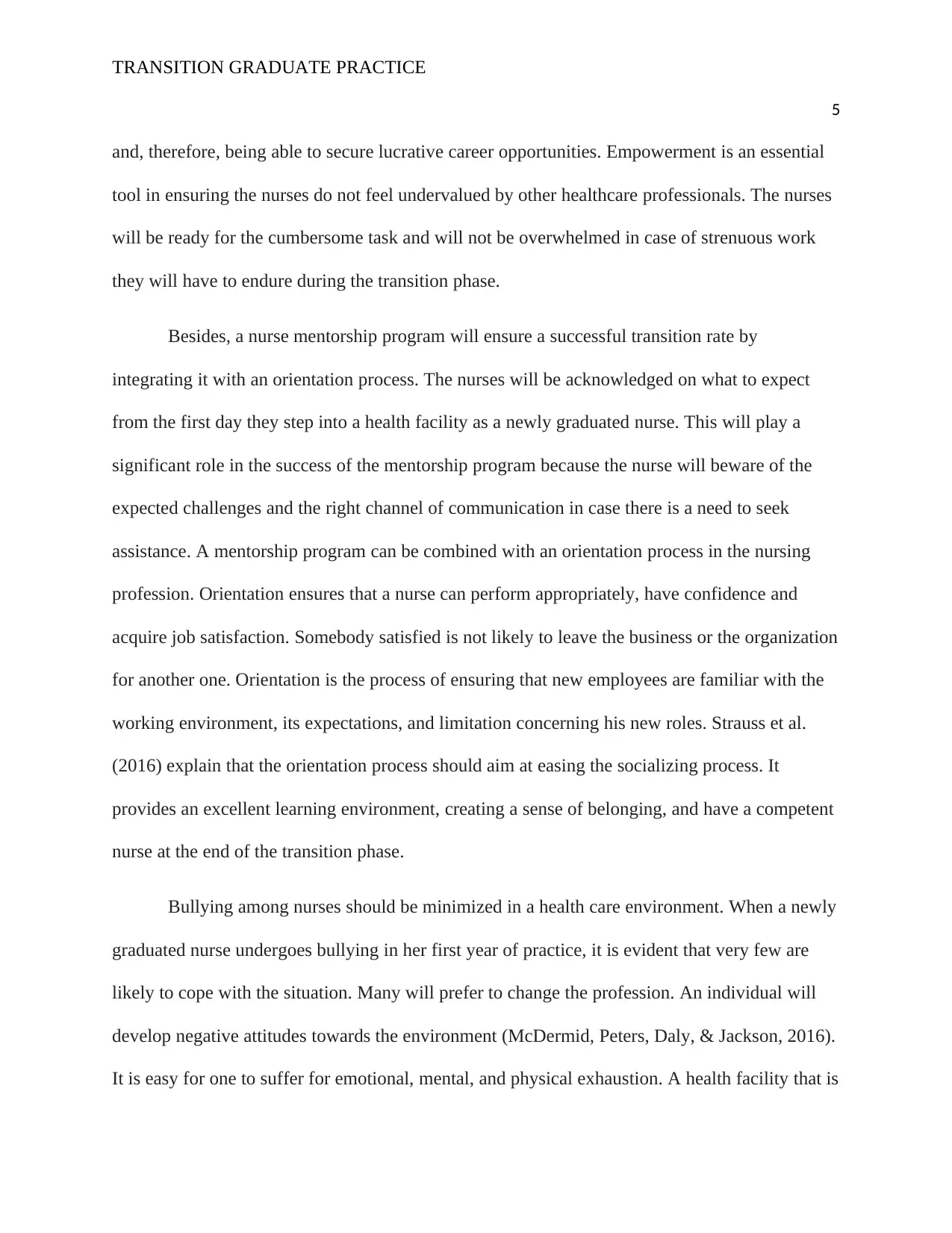
TRANSITION GRADUATE PRACTICE
5
and, therefore, being able to secure lucrative career opportunities. Empowerment is an essential
tool in ensuring the nurses do not feel undervalued by other healthcare professionals. The nurses
will be ready for the cumbersome task and will not be overwhelmed in case of strenuous work
they will have to endure during the transition phase.
Besides, a nurse mentorship program will ensure a successful transition rate by
integrating it with an orientation process. The nurses will be acknowledged on what to expect
from the first day they step into a health facility as a newly graduated nurse. This will play a
significant role in the success of the mentorship program because the nurse will beware of the
expected challenges and the right channel of communication in case there is a need to seek
assistance. A mentorship program can be combined with an orientation process in the nursing
profession. Orientation ensures that a nurse can perform appropriately, have confidence and
acquire job satisfaction. Somebody satisfied is not likely to leave the business or the organization
for another one. Orientation is the process of ensuring that new employees are familiar with the
working environment, its expectations, and limitation concerning his new roles. Strauss et al.
(2016) explain that the orientation process should aim at easing the socializing process. It
provides an excellent learning environment, creating a sense of belonging, and have a competent
nurse at the end of the transition phase.
Bullying among nurses should be minimized in a health care environment. When a newly
graduated nurse undergoes bullying in her first year of practice, it is evident that very few are
likely to cope with the situation. Many will prefer to change the profession. An individual will
develop negative attitudes towards the environment (McDermid, Peters, Daly, & Jackson, 2016).
It is easy for one to suffer for emotional, mental, and physical exhaustion. A health facility that is
5
and, therefore, being able to secure lucrative career opportunities. Empowerment is an essential
tool in ensuring the nurses do not feel undervalued by other healthcare professionals. The nurses
will be ready for the cumbersome task and will not be overwhelmed in case of strenuous work
they will have to endure during the transition phase.
Besides, a nurse mentorship program will ensure a successful transition rate by
integrating it with an orientation process. The nurses will be acknowledged on what to expect
from the first day they step into a health facility as a newly graduated nurse. This will play a
significant role in the success of the mentorship program because the nurse will beware of the
expected challenges and the right channel of communication in case there is a need to seek
assistance. A mentorship program can be combined with an orientation process in the nursing
profession. Orientation ensures that a nurse can perform appropriately, have confidence and
acquire job satisfaction. Somebody satisfied is not likely to leave the business or the organization
for another one. Orientation is the process of ensuring that new employees are familiar with the
working environment, its expectations, and limitation concerning his new roles. Strauss et al.
(2016) explain that the orientation process should aim at easing the socializing process. It
provides an excellent learning environment, creating a sense of belonging, and have a competent
nurse at the end of the transition phase.
Bullying among nurses should be minimized in a health care environment. When a newly
graduated nurse undergoes bullying in her first year of practice, it is evident that very few are
likely to cope with the situation. Many will prefer to change the profession. An individual will
develop negative attitudes towards the environment (McDermid, Peters, Daly, & Jackson, 2016).
It is easy for one to suffer for emotional, mental, and physical exhaustion. A health facility that is
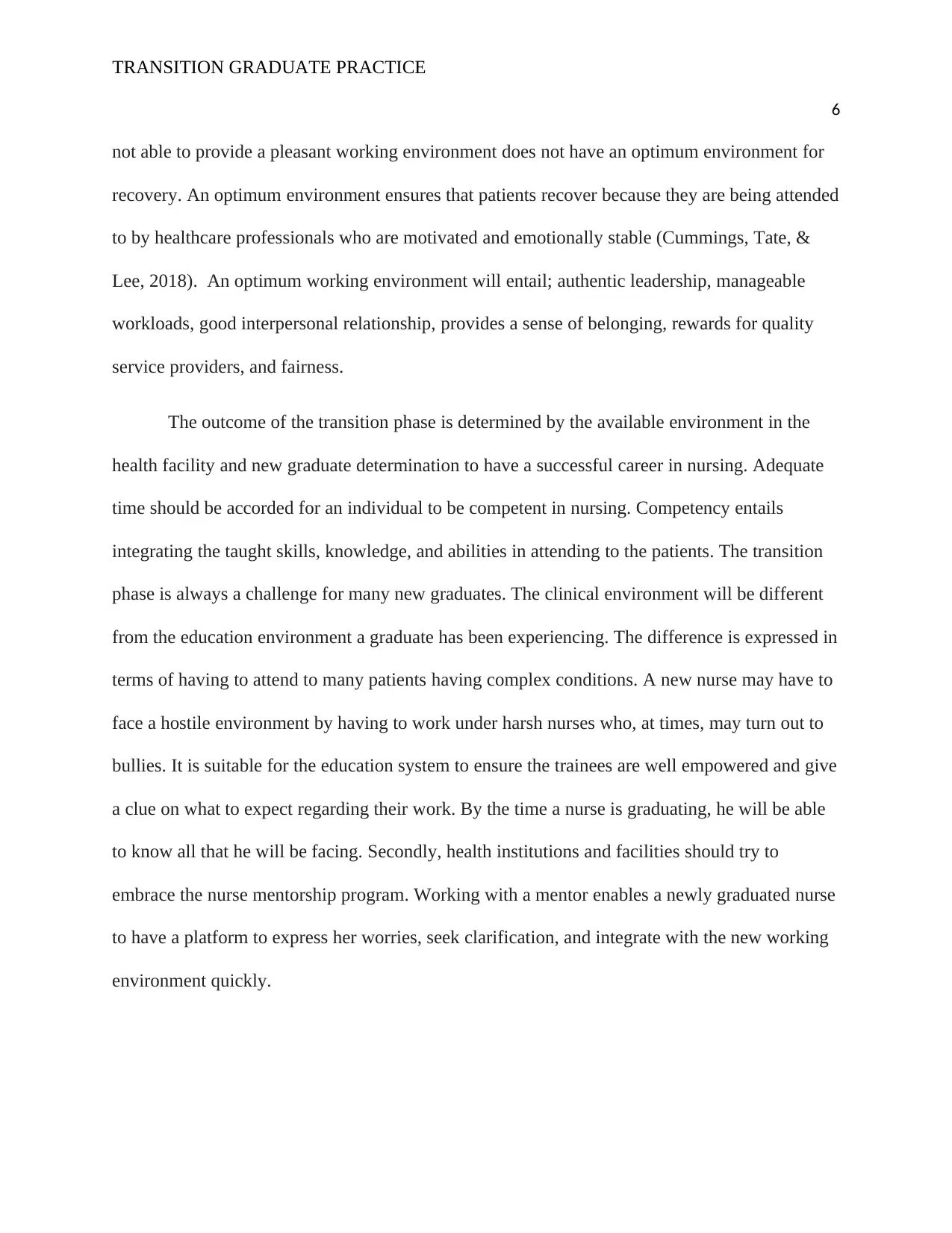
TRANSITION GRADUATE PRACTICE
6
not able to provide a pleasant working environment does not have an optimum environment for
recovery. An optimum environment ensures that patients recover because they are being attended
to by healthcare professionals who are motivated and emotionally stable (Cummings, Tate, &
Lee, 2018). An optimum working environment will entail; authentic leadership, manageable
workloads, good interpersonal relationship, provides a sense of belonging, rewards for quality
service providers, and fairness.
The outcome of the transition phase is determined by the available environment in the
health facility and new graduate determination to have a successful career in nursing. Adequate
time should be accorded for an individual to be competent in nursing. Competency entails
integrating the taught skills, knowledge, and abilities in attending to the patients. The transition
phase is always a challenge for many new graduates. The clinical environment will be different
from the education environment a graduate has been experiencing. The difference is expressed in
terms of having to attend to many patients having complex conditions. A new nurse may have to
face a hostile environment by having to work under harsh nurses who, at times, may turn out to
bullies. It is suitable for the education system to ensure the trainees are well empowered and give
a clue on what to expect regarding their work. By the time a nurse is graduating, he will be able
to know all that he will be facing. Secondly, health institutions and facilities should try to
embrace the nurse mentorship program. Working with a mentor enables a newly graduated nurse
to have a platform to express her worries, seek clarification, and integrate with the new working
environment quickly.
6
not able to provide a pleasant working environment does not have an optimum environment for
recovery. An optimum environment ensures that patients recover because they are being attended
to by healthcare professionals who are motivated and emotionally stable (Cummings, Tate, &
Lee, 2018). An optimum working environment will entail; authentic leadership, manageable
workloads, good interpersonal relationship, provides a sense of belonging, rewards for quality
service providers, and fairness.
The outcome of the transition phase is determined by the available environment in the
health facility and new graduate determination to have a successful career in nursing. Adequate
time should be accorded for an individual to be competent in nursing. Competency entails
integrating the taught skills, knowledge, and abilities in attending to the patients. The transition
phase is always a challenge for many new graduates. The clinical environment will be different
from the education environment a graduate has been experiencing. The difference is expressed in
terms of having to attend to many patients having complex conditions. A new nurse may have to
face a hostile environment by having to work under harsh nurses who, at times, may turn out to
bullies. It is suitable for the education system to ensure the trainees are well empowered and give
a clue on what to expect regarding their work. By the time a nurse is graduating, he will be able
to know all that he will be facing. Secondly, health institutions and facilities should try to
embrace the nurse mentorship program. Working with a mentor enables a newly graduated nurse
to have a platform to express her worries, seek clarification, and integrate with the new working
environment quickly.
⊘ This is a preview!⊘
Do you want full access?
Subscribe today to unlock all pages.

Trusted by 1+ million students worldwide

TRANSITION GRADUATE PRACTICE
7
7
Paraphrase This Document
Need a fresh take? Get an instant paraphrase of this document with our AI Paraphraser
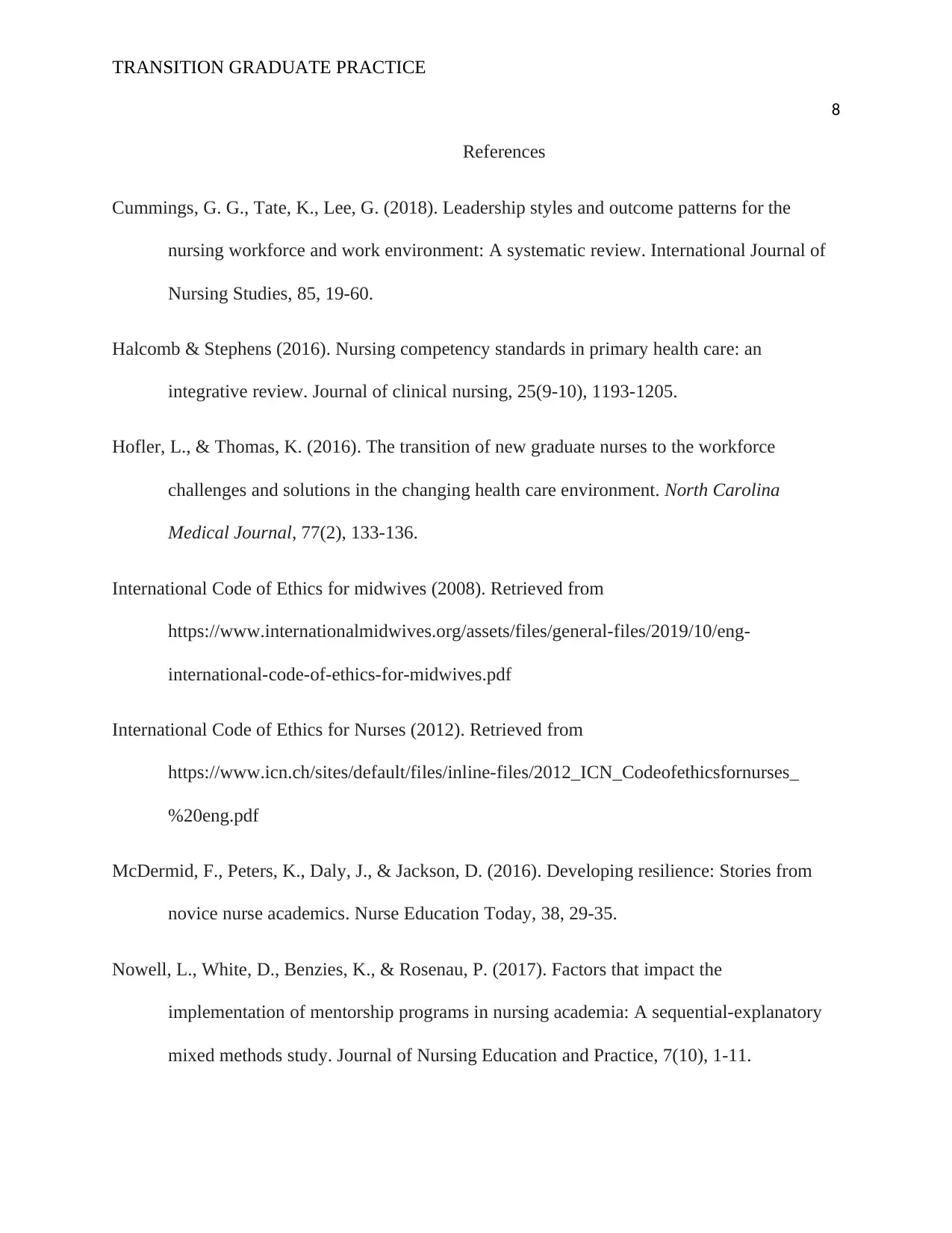
TRANSITION GRADUATE PRACTICE
8
References
Cummings, G. G., Tate, K., Lee, G. (2018). Leadership styles and outcome patterns for the
nursing workforce and work environment: A systematic review. International Journal of
Nursing Studies, 85, 19-60.
Halcomb & Stephens (2016). Nursing competency standards in primary health care: an
integrative review. Journal of clinical nursing, 25(9-10), 1193-1205.
Hofler, L., & Thomas, K. (2016). The transition of new graduate nurses to the workforce
challenges and solutions in the changing health care environment. North Carolina
Medical Journal, 77(2), 133-136.
International Code of Ethics for midwives (2008). Retrieved from
https://www.internationalmidwives.org/assets/files/general-files/2019/10/eng-
international-code-of-ethics-for-midwives.pdf
International Code of Ethics for Nurses (2012). Retrieved from
https://www.icn.ch/sites/default/files/inline-files/2012_ICN_Codeofethicsfornurses_
%20eng.pdf
McDermid, F., Peters, K., Daly, J., & Jackson, D. (2016). Developing resilience: Stories from
novice nurse academics. Nurse Education Today, 38, 29-35.
Nowell, L., White, D., Benzies, K., & Rosenau, P. (2017). Factors that impact the
implementation of mentorship programs in nursing academia: A sequential-explanatory
mixed methods study. Journal of Nursing Education and Practice, 7(10), 1-11.
8
References
Cummings, G. G., Tate, K., Lee, G. (2018). Leadership styles and outcome patterns for the
nursing workforce and work environment: A systematic review. International Journal of
Nursing Studies, 85, 19-60.
Halcomb & Stephens (2016). Nursing competency standards in primary health care: an
integrative review. Journal of clinical nursing, 25(9-10), 1193-1205.
Hofler, L., & Thomas, K. (2016). The transition of new graduate nurses to the workforce
challenges and solutions in the changing health care environment. North Carolina
Medical Journal, 77(2), 133-136.
International Code of Ethics for midwives (2008). Retrieved from
https://www.internationalmidwives.org/assets/files/general-files/2019/10/eng-
international-code-of-ethics-for-midwives.pdf
International Code of Ethics for Nurses (2012). Retrieved from
https://www.icn.ch/sites/default/files/inline-files/2012_ICN_Codeofethicsfornurses_
%20eng.pdf
McDermid, F., Peters, K., Daly, J., & Jackson, D. (2016). Developing resilience: Stories from
novice nurse academics. Nurse Education Today, 38, 29-35.
Nowell, L., White, D., Benzies, K., & Rosenau, P. (2017). Factors that impact the
implementation of mentorship programs in nursing academia: A sequential-explanatory
mixed methods study. Journal of Nursing Education and Practice, 7(10), 1-11.
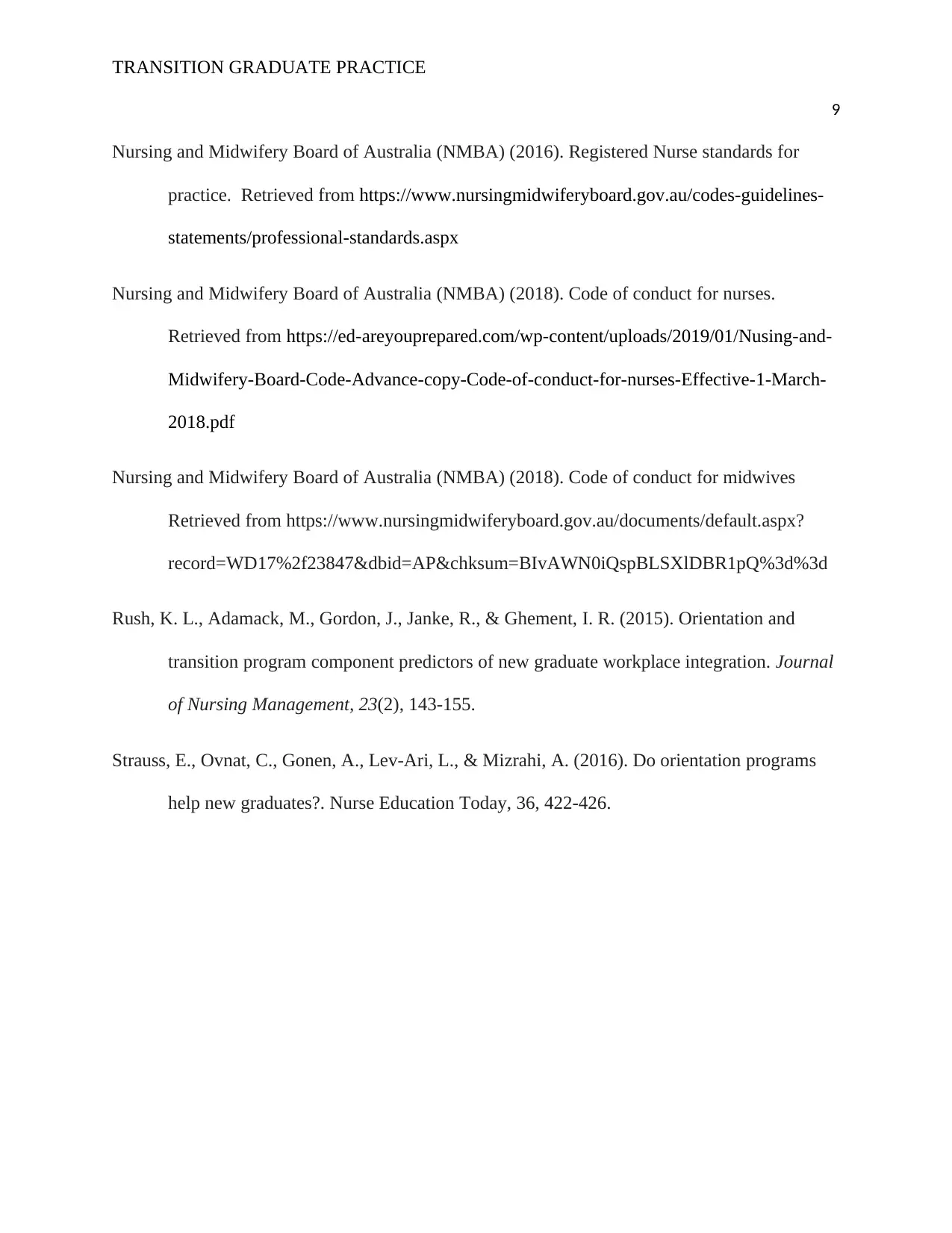
TRANSITION GRADUATE PRACTICE
9
Nursing and Midwifery Board of Australia (NMBA) (2016). Registered Nurse standards for
practice. Retrieved from https://www.nursingmidwiferyboard.gov.au/codes-guidelines-
statements/professional-standards.aspx
Nursing and Midwifery Board of Australia (NMBA) (2018). Code of conduct for nurses.
Retrieved from https://ed-areyouprepared.com/wp-content/uploads/2019/01/Nusing-and-
Midwifery-Board-Code-Advance-copy-Code-of-conduct-for-nurses-Effective-1-March-
2018.pdf
Nursing and Midwifery Board of Australia (NMBA) (2018). Code of conduct for midwives
Retrieved from https://www.nursingmidwiferyboard.gov.au/documents/default.aspx?
record=WD17%2f23847&dbid=AP&chksum=BIvAWN0iQspBLSXlDBR1pQ%3d%3d
Rush, K. L., Adamack, M., Gordon, J., Janke, R., & Ghement, I. R. (2015). Orientation and
transition program component predictors of new graduate workplace integration. Journal
of Nursing Management, 23(2), 143-155.
Strauss, E., Ovnat, C., Gonen, A., Lev-Ari, L., & Mizrahi, A. (2016). Do orientation programs
help new graduates?. Nurse Education Today, 36, 422-426.
9
Nursing and Midwifery Board of Australia (NMBA) (2016). Registered Nurse standards for
practice. Retrieved from https://www.nursingmidwiferyboard.gov.au/codes-guidelines-
statements/professional-standards.aspx
Nursing and Midwifery Board of Australia (NMBA) (2018). Code of conduct for nurses.
Retrieved from https://ed-areyouprepared.com/wp-content/uploads/2019/01/Nusing-and-
Midwifery-Board-Code-Advance-copy-Code-of-conduct-for-nurses-Effective-1-March-
2018.pdf
Nursing and Midwifery Board of Australia (NMBA) (2018). Code of conduct for midwives
Retrieved from https://www.nursingmidwiferyboard.gov.au/documents/default.aspx?
record=WD17%2f23847&dbid=AP&chksum=BIvAWN0iQspBLSXlDBR1pQ%3d%3d
Rush, K. L., Adamack, M., Gordon, J., Janke, R., & Ghement, I. R. (2015). Orientation and
transition program component predictors of new graduate workplace integration. Journal
of Nursing Management, 23(2), 143-155.
Strauss, E., Ovnat, C., Gonen, A., Lev-Ari, L., & Mizrahi, A. (2016). Do orientation programs
help new graduates?. Nurse Education Today, 36, 422-426.
⊘ This is a preview!⊘
Do you want full access?
Subscribe today to unlock all pages.

Trusted by 1+ million students worldwide
1 out of 9
Related Documents
Your All-in-One AI-Powered Toolkit for Academic Success.
+13062052269
info@desklib.com
Available 24*7 on WhatsApp / Email
![[object Object]](/_next/static/media/star-bottom.7253800d.svg)
Unlock your academic potential
Copyright © 2020–2026 A2Z Services. All Rights Reserved. Developed and managed by ZUCOL.





